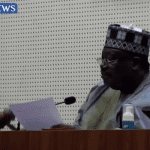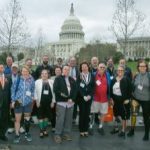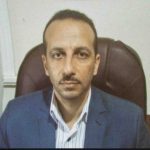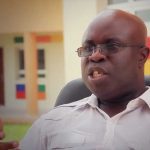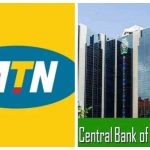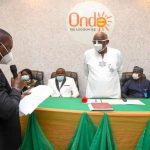TVC NEWS A Congolese rights group has written to the attorney general to demand a criminal investigation into a Reuters report that most of the money from fees for printing new passports goes overseas.
Documents reviewed by Reuters of a 2015 deal between Congo’s government and a Belgian company called Semlex to produce biometric passports show that most of the $185 price for a new passport goes to Semlex and a small company called LRPS in the United Arab Emirates.
The Congolese Association for Access to Justice (ACAJ) wrote to Attorney General Flory Kabange Numbi on Wednesday to demand he investigate the passports deal, “which has brought about enormous losses to the public treasury”, the letter seen by Reuters said.
Numbi did not immediately reply to a request for comment on whether he had seen the letter and how he planned to respond.
“We have written to the attorney general asking him to open an inquiry,” ACAJ President Georges Kapiamba told Reuters by telephone on Sunday.
“They need to produce an explanation. How do they explain to the Congolese what has happened to this money?”
Last Thursday Brussels prosecutors said they were investigating the deal with Semlex. Opposition leaders have also called on Congolese authorities to investigate.
In its article on Semlex published on April 13, Reuters reported that the UAE-listed firm LRPS – which receives $60 for every passport issued – is owned by Makie Makolo Wangoi, believed to be a close relative of President Joseph Kabila.
Neither the Congolese presidency nor Wangoi or Semlex responded to requests for comment on the Reuters story.
“It is very important that they identify this third person who has received the sum,” Kapiamba told reporters. “And if it is established clearly that this is corruption, they need to reimburse the Congolese state.”
The vast, resource-rich Central African state has been plagued by corruption almost since independence from Belgium in 1960. Kabila’s counselor on graft and money laundering said in 2015 that the country loses up to $15 billion a year to fraud, or roughly three times the annual fiscal budget.
Kabila also faces calls from the opposition to leave power this year after he did not step down at the end of his constitutional mandate in December. His supporters say delays to an election for his successor meant he had to stay on.
TVC NEWS A Congolese rights group has written to the attorney general to demand a criminal investigation into a Reuters report that most of the money from fees for printing new passports goes overseas.
Documents reviewed by Reuters of a 2015 deal between Congo’s government and a Belgian company called Semlex to produce biometric passports show that most of the $185 price for a new passport goes to Semlex and a small company called LRPS in the United Arab Emirates.
The Congolese Association for Access to Justice (ACAJ) wrote to Attorney General Flory Kabange Numbi on Wednesday to demand he investigate the passports deal, “which has brought about enormous losses to the public treasury”, the letter seen by Reuters said.
Numbi did not immediately reply to a request for comment on whether he had seen the letter and how he planned to respond.
“We have written to the attorney general asking him to open an inquiry,” ACAJ President Georges Kapiamba told Reuters by telephone on Sunday.
“They need to produce an explanation. How do they explain to the Congolese what has happened to this money?”
Last Thursday Brussels prosecutors said they were investigating the deal with Semlex. Opposition leaders have also called on Congolese authorities to investigate.
In its article on Semlex published on April 13, Reuters reported that the UAE-listed firm LRPS – which receives $60 for every passport issued – is owned by Makie Makolo Wangoi, believed to be a close relative of President Joseph Kabila.
Neither the Congolese presidency nor Wangoi or Semlex responded to requests for comment on the Reuters story.
“It is very important that they identify this third person who has received the sum,” Kapiamba told reporters. “And if it is established clearly that this is corruption, they need to reimburse the Congolese state.”
The vast, resource-rich Central African state has been plagued by corruption almost since independence from Belgium in 1960. Kabila’s counselor on graft and money laundering said in 2015 that the country loses up to $15 billion a year to fraud, or roughly three times the annual fiscal budget.
Kabila also faces calls from the opposition to leave power this year after he did not step down at the end of his constitutional mandate in December. His supporters say delays to an election for his successor meant he had to stay on.
TVC NEWS A Congolese rights group has written to the attorney general to demand a criminal investigation into a Reuters report that most of the money from fees for printing new passports goes overseas.
Documents reviewed by Reuters of a 2015 deal between Congo’s government and a Belgian company called Semlex to produce biometric passports show that most of the $185 price for a new passport goes to Semlex and a small company called LRPS in the United Arab Emirates.
The Congolese Association for Access to Justice (ACAJ) wrote to Attorney General Flory Kabange Numbi on Wednesday to demand he investigate the passports deal, “which has brought about enormous losses to the public treasury”, the letter seen by Reuters said.
Numbi did not immediately reply to a request for comment on whether he had seen the letter and how he planned to respond.
“We have written to the attorney general asking him to open an inquiry,” ACAJ President Georges Kapiamba told Reuters by telephone on Sunday.
“They need to produce an explanation. How do they explain to the Congolese what has happened to this money?”
Last Thursday Brussels prosecutors said they were investigating the deal with Semlex. Opposition leaders have also called on Congolese authorities to investigate.
In its article on Semlex published on April 13, Reuters reported that the UAE-listed firm LRPS – which receives $60 for every passport issued – is owned by Makie Makolo Wangoi, believed to be a close relative of President Joseph Kabila.
Neither the Congolese presidency nor Wangoi or Semlex responded to requests for comment on the Reuters story.
“It is very important that they identify this third person who has received the sum,” Kapiamba told reporters. “And if it is established clearly that this is corruption, they need to reimburse the Congolese state.”
The vast, resource-rich Central African state has been plagued by corruption almost since independence from Belgium in 1960. Kabila’s counselor on graft and money laundering said in 2015 that the country loses up to $15 billion a year to fraud, or roughly three times the annual fiscal budget.
Kabila also faces calls from the opposition to leave power this year after he did not step down at the end of his constitutional mandate in December. His supporters say delays to an election for his successor meant he had to stay on.
TVC NEWS A Congolese rights group has written to the attorney general to demand a criminal investigation into a Reuters report that most of the money from fees for printing new passports goes overseas.
Documents reviewed by Reuters of a 2015 deal between Congo’s government and a Belgian company called Semlex to produce biometric passports show that most of the $185 price for a new passport goes to Semlex and a small company called LRPS in the United Arab Emirates.
The Congolese Association for Access to Justice (ACAJ) wrote to Attorney General Flory Kabange Numbi on Wednesday to demand he investigate the passports deal, “which has brought about enormous losses to the public treasury”, the letter seen by Reuters said.
Numbi did not immediately reply to a request for comment on whether he had seen the letter and how he planned to respond.
“We have written to the attorney general asking him to open an inquiry,” ACAJ President Georges Kapiamba told Reuters by telephone on Sunday.
“They need to produce an explanation. How do they explain to the Congolese what has happened to this money?”
Last Thursday Brussels prosecutors said they were investigating the deal with Semlex. Opposition leaders have also called on Congolese authorities to investigate.
In its article on Semlex published on April 13, Reuters reported that the UAE-listed firm LRPS – which receives $60 for every passport issued – is owned by Makie Makolo Wangoi, believed to be a close relative of President Joseph Kabila.
Neither the Congolese presidency nor Wangoi or Semlex responded to requests for comment on the Reuters story.
“It is very important that they identify this third person who has received the sum,” Kapiamba told reporters. “And if it is established clearly that this is corruption, they need to reimburse the Congolese state.”
The vast, resource-rich Central African state has been plagued by corruption almost since independence from Belgium in 1960. Kabila’s counselor on graft and money laundering said in 2015 that the country loses up to $15 billion a year to fraud, or roughly three times the annual fiscal budget.
Kabila also faces calls from the opposition to leave power this year after he did not step down at the end of his constitutional mandate in December. His supporters say delays to an election for his successor meant he had to stay on.
TVC NEWS A Congolese rights group has written to the attorney general to demand a criminal investigation into a Reuters report that most of the money from fees for printing new passports goes overseas.
Documents reviewed by Reuters of a 2015 deal between Congo’s government and a Belgian company called Semlex to produce biometric passports show that most of the $185 price for a new passport goes to Semlex and a small company called LRPS in the United Arab Emirates.
The Congolese Association for Access to Justice (ACAJ) wrote to Attorney General Flory Kabange Numbi on Wednesday to demand he investigate the passports deal, “which has brought about enormous losses to the public treasury”, the letter seen by Reuters said.
Numbi did not immediately reply to a request for comment on whether he had seen the letter and how he planned to respond.
“We have written to the attorney general asking him to open an inquiry,” ACAJ President Georges Kapiamba told Reuters by telephone on Sunday.
“They need to produce an explanation. How do they explain to the Congolese what has happened to this money?”
Last Thursday Brussels prosecutors said they were investigating the deal with Semlex. Opposition leaders have also called on Congolese authorities to investigate.
In its article on Semlex published on April 13, Reuters reported that the UAE-listed firm LRPS – which receives $60 for every passport issued – is owned by Makie Makolo Wangoi, believed to be a close relative of President Joseph Kabila.
Neither the Congolese presidency nor Wangoi or Semlex responded to requests for comment on the Reuters story.
“It is very important that they identify this third person who has received the sum,” Kapiamba told reporters. “And if it is established clearly that this is corruption, they need to reimburse the Congolese state.”
The vast, resource-rich Central African state has been plagued by corruption almost since independence from Belgium in 1960. Kabila’s counselor on graft and money laundering said in 2015 that the country loses up to $15 billion a year to fraud, or roughly three times the annual fiscal budget.
Kabila also faces calls from the opposition to leave power this year after he did not step down at the end of his constitutional mandate in December. His supporters say delays to an election for his successor meant he had to stay on.
TVC NEWS A Congolese rights group has written to the attorney general to demand a criminal investigation into a Reuters report that most of the money from fees for printing new passports goes overseas.
Documents reviewed by Reuters of a 2015 deal between Congo’s government and a Belgian company called Semlex to produce biometric passports show that most of the $185 price for a new passport goes to Semlex and a small company called LRPS in the United Arab Emirates.
The Congolese Association for Access to Justice (ACAJ) wrote to Attorney General Flory Kabange Numbi on Wednesday to demand he investigate the passports deal, “which has brought about enormous losses to the public treasury”, the letter seen by Reuters said.
Numbi did not immediately reply to a request for comment on whether he had seen the letter and how he planned to respond.
“We have written to the attorney general asking him to open an inquiry,” ACAJ President Georges Kapiamba told Reuters by telephone on Sunday.
“They need to produce an explanation. How do they explain to the Congolese what has happened to this money?”
Last Thursday Brussels prosecutors said they were investigating the deal with Semlex. Opposition leaders have also called on Congolese authorities to investigate.
In its article on Semlex published on April 13, Reuters reported that the UAE-listed firm LRPS – which receives $60 for every passport issued – is owned by Makie Makolo Wangoi, believed to be a close relative of President Joseph Kabila.
Neither the Congolese presidency nor Wangoi or Semlex responded to requests for comment on the Reuters story.
“It is very important that they identify this third person who has received the sum,” Kapiamba told reporters. “And if it is established clearly that this is corruption, they need to reimburse the Congolese state.”
The vast, resource-rich Central African state has been plagued by corruption almost since independence from Belgium in 1960. Kabila’s counselor on graft and money laundering said in 2015 that the country loses up to $15 billion a year to fraud, or roughly three times the annual fiscal budget.
Kabila also faces calls from the opposition to leave power this year after he did not step down at the end of his constitutional mandate in December. His supporters say delays to an election for his successor meant he had to stay on.
TVC NEWS A Congolese rights group has written to the attorney general to demand a criminal investigation into a Reuters report that most of the money from fees for printing new passports goes overseas.
Documents reviewed by Reuters of a 2015 deal between Congo’s government and a Belgian company called Semlex to produce biometric passports show that most of the $185 price for a new passport goes to Semlex and a small company called LRPS in the United Arab Emirates.
The Congolese Association for Access to Justice (ACAJ) wrote to Attorney General Flory Kabange Numbi on Wednesday to demand he investigate the passports deal, “which has brought about enormous losses to the public treasury”, the letter seen by Reuters said.
Numbi did not immediately reply to a request for comment on whether he had seen the letter and how he planned to respond.
“We have written to the attorney general asking him to open an inquiry,” ACAJ President Georges Kapiamba told Reuters by telephone on Sunday.
“They need to produce an explanation. How do they explain to the Congolese what has happened to this money?”
Last Thursday Brussels prosecutors said they were investigating the deal with Semlex. Opposition leaders have also called on Congolese authorities to investigate.
In its article on Semlex published on April 13, Reuters reported that the UAE-listed firm LRPS – which receives $60 for every passport issued – is owned by Makie Makolo Wangoi, believed to be a close relative of President Joseph Kabila.
Neither the Congolese presidency nor Wangoi or Semlex responded to requests for comment on the Reuters story.
“It is very important that they identify this third person who has received the sum,” Kapiamba told reporters. “And if it is established clearly that this is corruption, they need to reimburse the Congolese state.”
The vast, resource-rich Central African state has been plagued by corruption almost since independence from Belgium in 1960. Kabila’s counselor on graft and money laundering said in 2015 that the country loses up to $15 billion a year to fraud, or roughly three times the annual fiscal budget.
Kabila also faces calls from the opposition to leave power this year after he did not step down at the end of his constitutional mandate in December. His supporters say delays to an election for his successor meant he had to stay on.
TVC NEWS A Congolese rights group has written to the attorney general to demand a criminal investigation into a Reuters report that most of the money from fees for printing new passports goes overseas.
Documents reviewed by Reuters of a 2015 deal between Congo’s government and a Belgian company called Semlex to produce biometric passports show that most of the $185 price for a new passport goes to Semlex and a small company called LRPS in the United Arab Emirates.
The Congolese Association for Access to Justice (ACAJ) wrote to Attorney General Flory Kabange Numbi on Wednesday to demand he investigate the passports deal, “which has brought about enormous losses to the public treasury”, the letter seen by Reuters said.
Numbi did not immediately reply to a request for comment on whether he had seen the letter and how he planned to respond.
“We have written to the attorney general asking him to open an inquiry,” ACAJ President Georges Kapiamba told Reuters by telephone on Sunday.
“They need to produce an explanation. How do they explain to the Congolese what has happened to this money?”
Last Thursday Brussels prosecutors said they were investigating the deal with Semlex. Opposition leaders have also called on Congolese authorities to investigate.
In its article on Semlex published on April 13, Reuters reported that the UAE-listed firm LRPS – which receives $60 for every passport issued – is owned by Makie Makolo Wangoi, believed to be a close relative of President Joseph Kabila.
Neither the Congolese presidency nor Wangoi or Semlex responded to requests for comment on the Reuters story.
“It is very important that they identify this third person who has received the sum,” Kapiamba told reporters. “And if it is established clearly that this is corruption, they need to reimburse the Congolese state.”
The vast, resource-rich Central African state has been plagued by corruption almost since independence from Belgium in 1960. Kabila’s counselor on graft and money laundering said in 2015 that the country loses up to $15 billion a year to fraud, or roughly three times the annual fiscal budget.
Kabila also faces calls from the opposition to leave power this year after he did not step down at the end of his constitutional mandate in December. His supporters say delays to an election for his successor meant he had to stay on.


